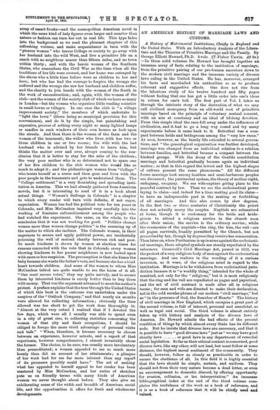CUSTOMS.
A History of Matrimonial Institutions, Chiefly in England and the United States. With an Introductory Analysis of the Litera- ture and the Theories of Primitive Marriage and the Family. By George Elliott Howard, Ph.D. 3 vols. (T. Fisher Unwin. ..22 2s.) --In these solid volumes Dr. Howard has brought together an immense array of facts relating to the institution of marriage, from the primitive pairing of our pre-human ancestors down to the modern civil marriage and the immense variety of divorce laws ruling in the United States. He has, moreover, arranged his facts and marshalled his authorities so as to produce coherent and suggestive effects. One does not rise from the laborious study of his twelve hundred and fifty pages without feeling that one has got a little order into one's ideas in return for one's toil. The first part of Vol. I. takes us through the intricate story of the derivation of what we may call civilised monogamy from an old-world root of primitive marriage based on the principle of voluntary mutual consent, with an aim at constancy and an ideal of lifelong devotion. From this simple ideal the race fell away under the influences of civilisation, and it had to go a long way round and try many experiments before it came back to it. Betrothal was a com- pact between bride and bridegroom among the "very low races." As soon, however, as the family life extended to several genera- tions, and "the genealogical organisation was further developed, marriage was changed from an individual relation to a relation between families, and betrothal became a compact between the kindred groups. With the decay of the Gentile constitution marriage and betrothal gradually became again an individual matter; so that in this regard the lowest and the highest stages of culture present the same phenomena." All the different forms marriage took among heathen and semi-barbarous peoples are discussed ; the patriarchal system, the theory of mother-right, endogamy, exogamy. We see wife-capture giving place to the peaceful contract by law. Then we see the ecclesiastical power trying to claim—and indeed for a time making good its claim— to have an indispensable part in the making or forbidding of all marriages. And this also comes by slow degrees. In the first two or three centuries of Christianity the priest does not actually marry the couples. Nuptials are solemnised at home, though it is customary for the bride and bride- groom to attend a religious service in the church soon after their union; the service is the ordinary service; while the ceremonies of the nuptials—the ring, the kiss, the veil—are all pagan survivals, frankly permitted by the Church, but not prescribed by her, though by degrees they receive her consecration. Then later on, when Puritanism is up in arms against the ecclesiasti- cal marriage, these adopted symbols are sternly repudiated by the reformers. Cromwell's Civil Marriage Act, passed in 1053, was the protest of a very religious body of men against the ecclesiastical marriage. And one realises in the wording of it a curious inversion, 49 it were, of the religious mind in regard to the institution. Marriage is to be withdrawn from ecclesiastical juris- diction because it is "a worldly thing," intended for the whole of mankind, not only for the "religious," but it is most religiously that the ring and the veil are repudiated as pagan and papistical, and the act of civil contract is made after all in religious terms ; for man and wife are directed to make their declaration, not in the cold secular phrase of our modern "civil marriage," but as " in the presence of God, the Searcher of Hearts." The history of civil marriage in New England, which occupies a great part of the second volume, is full of interest, personal and anecdotal, as well as legal and social. The third volume is almost entirely taken up with history and analysis of the divorce laws of America. Dr. Howard admits the bad effects of the present condition of things by which almost every State has its different code. But he insists that divorce laws are necessary, and that it is possible to have "good divorce laws" just as "we may have good charity laws or good laws in any department of remedial social legislation. So far as their ethical content is concerned, good divorce laws, like any other, will not lead, but must follow at some distance, the highest moral sentiment of the community. They should, however, follow as closely as practicable in order to secure the obedience of all. In this field it is highly essential that the laws should be simple, certain, and uniform. They should not from their very nature become a dead letter, or even an encouragement to domestic discord, by offering opportunity for evasion, collusion, or lax interpretation." An immense bibliographical index at the end of the third volume com- pletes the usefulness of the work as a book of reference, and it is as a book of reference that it will be chiefly used and veined.


















































 Previous page
Previous page